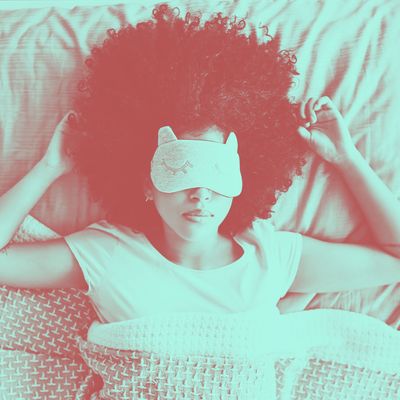
Last night, I missed my bedtime by a full two hours, and today, I’m an anxious, irritable wreck. (It’s not even noon.) Coincidence? No — not according to new research recently presented at the annual Society for Neuroscience meeting in San Diego, which suggests that a lack of sleep triggers the same brain mechanisms that make us sensitive to anxiety.
While the association between sleep loss and anxiety isn’t exactly groundbreaking (we know, for instance, that people with insomnia have double the risk of developing an anxiety disorder), the new study — led by Eti Ben-Simon, a postdoctoral fellow in the department of neuroscience at the University of California, Berkeley — establishes how this correlational relationship functions in the brain.
In their study, researchers had healthy subjects spend two nights in their sleep lab: the first, intentionally sleep deprived, and the following, restful. In the morning, researchers showed the subjects “distressing” video clips to evoke an emotional reaction, and then took fMRI scans of their brains. On the morning after disturbed sleep, subjects’ brains showed significantly more activity in “emotion-generating” areas of the brain, like the amygdala and the dorsal anterior cingulate cortex, both of which process negative emotions like fear, and both of which are highly active in people with anxiety disorders. Researchers found that subjects experienced 30 percent higher anxiety on the day following poor sleep than on the day following restful sleep, with half of those subjects reaching levels which met the threshold for a clinical anxiety disorder.
“[Brain] regions that help us regulate emotions are the ones that help keep us less anxious and keep us calm, and those regions are very sensitive to sleep loss,” Ben-Simon told Popular Science.
Which brings us to another emotion that is very susceptible to sleep loss: anger. Another study, recently published in the Journal of Experimental Psychology: General, found that sleep-deprived individuals (those subjects asked to restrict their sleep by two to four hours a night for two nights — like I did, selflessly, last night) rated themselves substantially angrier than their well-rested counterparts (who averaged 7 hours of sleep a night).
While the anxiety experiment showed subjects returning to normal stress levels after resuming quality sleep, both studies revealed the potential for a compounding problem — sleep-deprived individuals only got angrier with each sleepless night, just as people with insomnia tend to get more anxious over time. These issues may also be cyclical; certainly, anxious people experience more difficulty sleeping, and one could speculate that the same might apply to angry people, though, personally, I find anger exhausting. (Stress, too, in certain cases.) Based on their results, the authors of the anger study are collecting data to see if sleep loss causes actual aggression toward others, which seems like a probable “yes.”
Some (but not all) anti-anxiety medications may reduce sleep disturbances, but it’s unclear which (if any) have a net-positive impact on sleep quality, which is why many neurologists consider cognitive behavioral therapy (CBT) a better, lower-risk treatment option for sleep deprivation. The hope, then, is that treating one’s sleep deprivation would improve one’s anxiety, or one’s anger, or both. Everything is related, and it’s hard to get every variable in the right place and then keep it there. But the main thing is that everyone should go to bed at 8:45.





